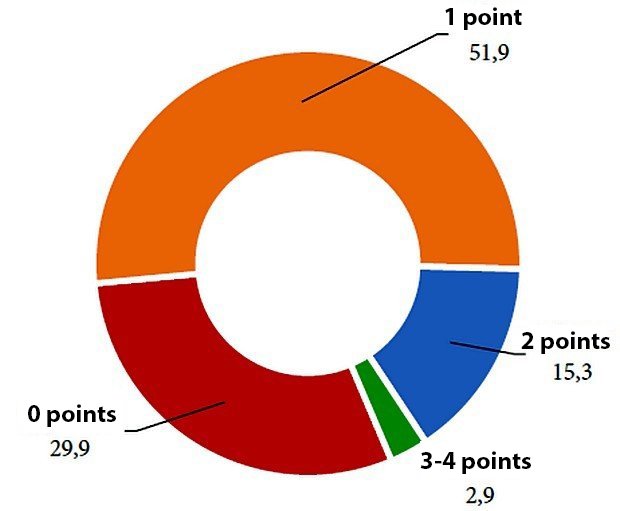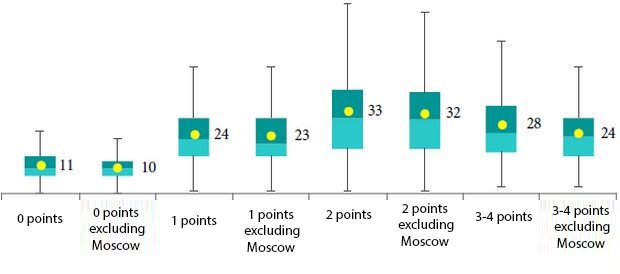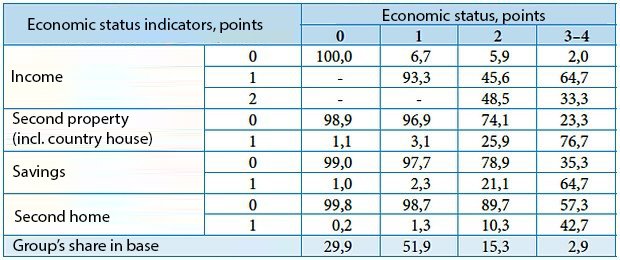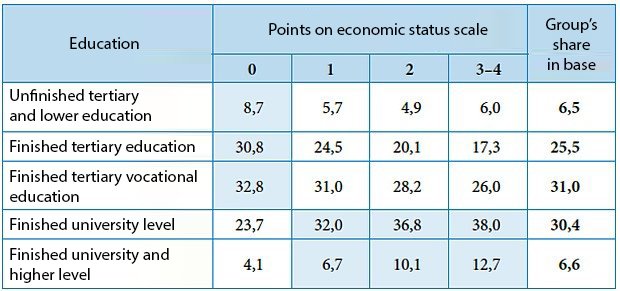To live as well as others: most Russians can't and don't want to increase their income
How Higher School of Economics postgraduate detected depressing facts about the working population of Russia
More than a half of working Russians can be attributed to the group of people with a low economic status, while a third of citizens' status is equal to zero. Such people's incomes don't exceed 13-20,000 rubles a month. The biggest part of the working population doesn't aspire to improve the quality of their life saying ''to live as well as others''. A researcher from the Higher School of Economics came to such a depressing conclusion. Realnoe Vremya tells the details.
'Bar' of 20,000
Applied Economics programme postgraduate of the Higher School of Economics National Research University Nina Kolennikova did research about the economic status of working population of Russia and its social attitude. And she came to a hard-hitting conclusion: more than a half of working Russians live on their salary only, can't buy property or save money and, as a rule, aren't able and don't try to improve the quality of their life with their knowledge and skills.
Surveys of 5,230 people conducted in October 2015 – January 2016 by the Higher School of Economics's and Demoscope PLC with the participation of the Carolina Population Center from the University of North Carolina and the Institute of Sociology of the Russian Academy of Sciences were the base for the research. Kolennikova generalised replies of the respondents about the level of personal income, realty and savings. The participants of the survey were divided into four categories on the basis of these data.
The first group includes people who have a zero economic status. More than half of the respondents who are in this group have a monthly salary of from 0 to 0,75 median income in their regions. In monetary terms, it's 7-15,000 rubles (to 13,000 rubles excluding citizens of Moscow).
The second category is people with an economic status that's equal to one. Their incomes total from 0,76 to 2 regional medians, or 15-30,000 rubles (to 20,000 excluding citizens of Moscow).
The Russians who scored 2 points are in the third category. Most two-point scorers have an income exceeding 2 regional medians – to 33,000 rubles (to 32,000 excluding Moscow).
Finally, the highest economic status was granted to the respondents who scored 3-4 points. It's interesting that incomes in this group are lower than that of those who scored 2 points: the highest bar is 28,000 rubles (24,000 excluding citizens of Moscow). At the same time, people who are in this category often have an additional dwelling and save money.
29,9% of people had the lowest economic status after analysing all data. Most part (51,9%) had one point. Another 15,3% of respondents got 2 points, 2,9% were in the highest category.
Distribution of working population of Russia on economic status scale

Features
Mainly savings and additional property distinguish people with different economic statuses. However, the research showed there were other differences too – in education, type of work and even in the frequency of salary delays and aspirations in life.
So 3,4% saved money in 2015 among people with income lower than two medians, 1,4% have a second house, while 3,1% of such respondents had dacha or a country house. 21,5% of people had savings in the group of people with two points, 10,5% had the second house, 26,1% — had dacha. Respondents with a higher economic status had additional property more often than others. 65% of them had savings, 42% — a second house, 77,6% possessed dacha or a country house. These numbers exclude citizens of Moscow, as the share of people who have additional property is lower.
Income in groups with different indicators on economic status scale

The fact that the respondents from the highest group don't have the highest income but at the same time have property means that the possession of additional property makes feel there is firmness in reserve, and it doesn't motivate workers to increase their current income, especially in Moscow where real estate can be a source of significant income compared with a salary.
Results of the surveys prove that the workers with the lowest economic status more often have delayed salaries: 46,9% of respondents face it in the group of people who scored zero points, while their share in the highest group is 1,9%. In addition, the low-income citizens are afraid of losing their job most. Representatives of the second group (with one point) also worry about it, though to a lesser extent.
Distribution of working population of Russia on the economic status scale and indicators

Clear 'norm'
In developed countries, a person's economic status is determined by his education and position in labour relations, what the popularity of the concept of human capital shows; in modern Russia, the role of human capital isn't big, Kolennikova concludes.
On the one hand, the share of workers with higher education grows with the transition from the low-income to the high-income group (23,7% in the first case, 38% — in the last one). Nevertheless, most people with higher education are concentrated in the groups of people with zero and one points. Moreover, quite many workers (26%) in the highest group have tertiary education.
Most respondents with the lowest economic status come from the professional group of workers in trade and services (23,8%). Over 18% are in the group of semi-professionals, another 14% are unqualified workers from all sectors. People from the highest group often belong to the group of professionals (24,8%) and semi-professionals (over 20%).
Education in groups with different economic status indicators

The fact that most population has the same economic status indicator that's equal to one point allows to make a conclusion about the existence of an expressed ''norm'' in Russian society, Kolennikova notes: ''Social attitudes James Duesenberry described as early as 1949 exist in the majority of the working population in Russia — to live as well as others and to live no worse than previously. With such attitudes, a person not only can't but doesn't want to save money and purchase additional economic resources. Having habitual consumer patterns that are characteristic of the social class he belongs to is the most important thing for him.